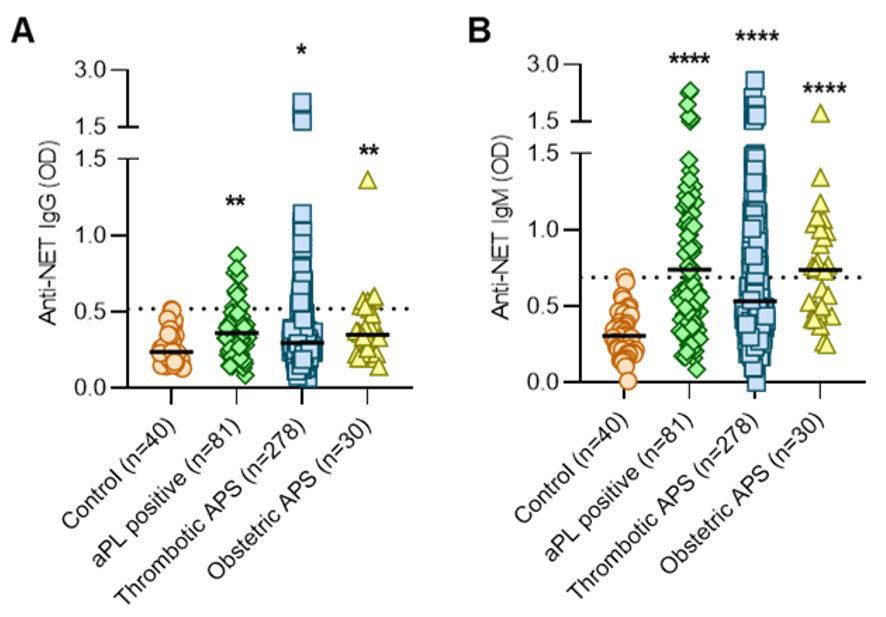Session Information
Session Type: Abstract Session
Session Time: 5:00PM-6:00PM
Background/Purpose: The release of neutrophil extracellular traps (NETs) by hyperactive neutrophils plays a role in the thromboinflammatory phenotype of APS. Previous work has demonstrated that some patients with APS have autoantibodies targeting NETs, which impair NET clearance and potentially activate complement. Here, we aimed to elucidate the presence, clinical associations, and antigen specificities of anti-NET antibodies in a large, ethnically diverse cohort of antiphospholipid antibody (aPL)-positive patients who did not have lupus.
Methods: Levels of anti-NET IgG/IgM were determined in sera of 308 patients with primary APS and 81 patients who were aPL positive but without “criteria” APS manifestations or other systemic autoimmune disease diagnosis. A positive cut-off for anti-NET level was established at the 99th percentile optical density of healthy-control samples. Multivariate logistic regression with best variable model selection was used to determine clinical associations. For a subset of patients (n=214), we profiled autoantibodies with a microarray platform that included 120 potential autoantigens (66 associated with NETs based on literature mining).
Results: We found elevated levels of anti-NET IgG or IgM in 45% of aPL-positive patients, whether they met criteria for primary APS or not (Figure 1A-B). There was a strong relationship between anti-NET IgG and anti-NET IgM (r=0.52, p< 0.0001). High anti-NET antibody levels correlated with a circulating marker of NETs, myeloperoxidase (MPO)-DNA complexes (IgG r=0.12, p=0.02; IgM r=0.16, p=0.001). Anti-NET activity also demonstrated a positive correlation with levels of traditional aPL (anti-beta-2 glycoprotein I IgG: r=0.21, p< 0.0001) and anticardiolipin IgG: r=0.19, p=0.0001). When considering clinical manifestations among aPL-positive patients, positive anti-NET IgG was strongly associated with brain white matter changes after adjusting for demographic variables and criteria aPL profiles (OR=11, 95% CI 1.9 to 62), but not with other aPL-related manifestations. By immunofluorescence microscopy, we determined that high anti-NET sera more efficiently deposited complement C3d on NETs. In pursuit of the antigen specificity of anti-NET antibodies, 214 samples were analyzed by autoantibody microarray. Anti-NET IgG positivity significantly associated with the following antigens: citrullinated-histone H1 and H4, MPO-DNA complexes, nucleosomes, centromere protein A (a histone H3 variant), heparan sulfate proteoglycan, laminin, and collagen VI. Meanwhile, anti-NET IgM positivity associated with the following: single-stranded DNA, double-stranded DNA, and proliferating cell nuclear antigen.
Conclusion: In summary, these data reveal high levels of anti-NET antibodies in 45% of aPL-positive patients wherein they potentially activate the complement cascade and contribute to white matter changes. While anti-NET IgM may especially target DNA in NETs, anti-NET IgG appear more likely to target protein antigens.
To cite this abstract in AMA style:
Zuo Y, Navaz S, Tsodikov A, Kmetova K, Hoy C, Yalavarthi S, Castro Oliveira de Andrade D, Tektonidou M, Sciascia S, Pengo V, Ruiz-Irastorza G, Belmont H, gerosa m, fortin P, de Jesús G, Branch D, Andreoli L, Rodriguez Almaraz E, Petri M, Cervera R, Willis R, Erkan D, Knight J. Anti-NET Antibodies in Antiphospholipid Antibody-positive Patients: Results from the Antiphospholipid Syndrome Alliance for Clinical Trials and InternatiOnal Networking (APS ACTION) Clinical Database and Repository (“Registry”) [abstract]. Arthritis Rheumatol. 2022; 74 (suppl 9). https://acrabstracts.org/abstract/anti-net-antibodies-in-antiphospholipid-antibody-positive-patients-results-from-the-antiphospholipid-syndrome-alliance-for-clinical-trials-and-international-networking-aps-action-clinical-database/. Accessed .« Back to ACR Convergence 2022
ACR Meeting Abstracts - https://acrabstracts.org/abstract/anti-net-antibodies-in-antiphospholipid-antibody-positive-patients-results-from-the-antiphospholipid-syndrome-alliance-for-clinical-trials-and-international-networking-aps-action-clinical-database/

